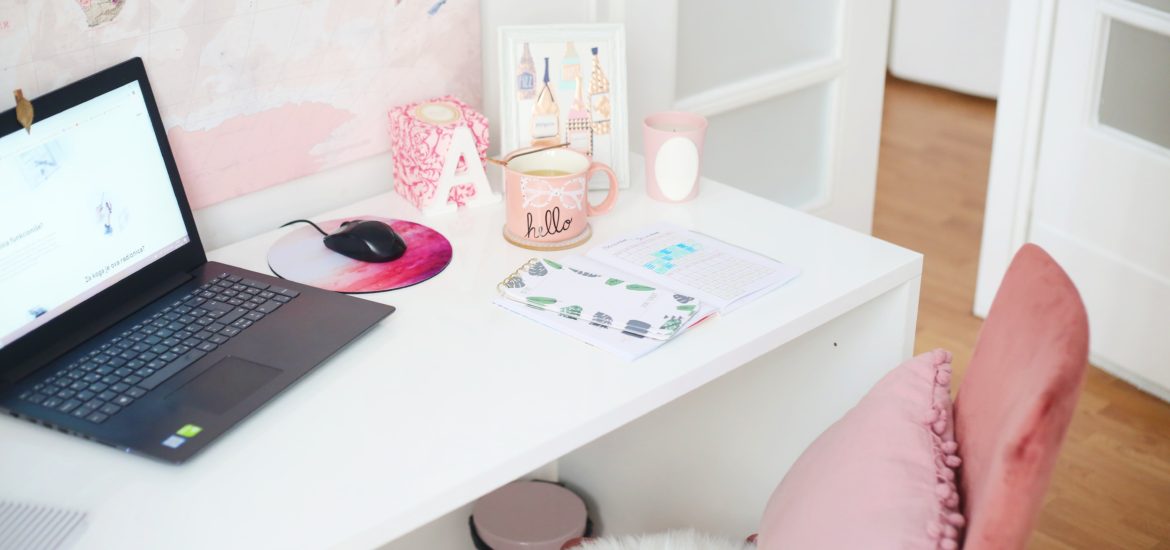Working in an office when you have IBS can feel daunting. Getting up early, dealing with the fear of flares, often not enough privacy in the bathroom. And then there is the commute, the stress, the meetings, and the co-workers. While an office might never feel as comfortable as your own home, here are some tips to make working with IBS a little bit easier.
Routines to minimise IBS symptoms at work
For me, the one of the hardest parts about working with IBS was going to work. I was so anxious that I would literally feel sick in the mornings. The other hard part was dealing with IBS symptoms at work. I have written a detailed article about the importance of routine for dealing with IBS, and the main point is that you need to find a way to work around your IBS as much as possible.
Knowing during what time of day you’re most prone to symptoms can help so much. First, you can try and avoid meetings during these times as much as possible. You might even me able to shift your work hours a little bit to accommodate your IBS.
For example, if your symptoms are worse in the mornings, you could go to work a little later, even if that means staying a bit later as well. I always woke up 3 hours before leaving to deal with symptoms at home. If your symptoms are worse at night, you could try shifting your hours to early mornings.
Of course, shifting work hours isn’t always possible. If you can’t do that, you might be able to create a meal routine to minimise IBS symptoms at work. Eating only safe foods on work days, even for breakfast and dinner, can help a lot. This might mean that you eat more white rice than you’d like, but if this helps you experience fewer flares, it might be worth it.
Meditating and doing breathing exercises, even during the day, might also do wonders, especially if your IBS is triggered by stress and anxiety.
Basically, focus on trying to stay as calm as possible. Plan ahead ahead so you can feel prepared and don’t have to worry unnecessarily.
Talking about IBS at work
Being honest about your condition is an important part of working with IBS.
I’m not saying that you have to give a detailed description of all the symptoms that you’re facing. You don’t even have to say that you actually have IBS. But mention that you have a stomach condition that makes you sensitive to certain foods. This way, you won’t have to find an explanation every time you get invited to that pizza place that will inevitably make you sick.
Believe me, I’ve been there, and trying to get out of lunch invitations without being rude is so hard when your co-workers don’t know the truth. I ended up telling them about my condition – without going into detail – so that they knew why I was often feeling sick, and why I didn’t want to try new foods.
In addition, you might also be able to negotiate flexible working hours or even working from home some days. You’ll never know until you try.
Self-care during bad IBS days
Even when you don’t have actual IBS attacks at work, you might sometimes feel unwell during the day. For these situations, I love drinking herbal tea like chamomile, peppermint, or ginger, listening to calming music, and taking medication if needed to manage symptoms.
I would do the most repetitive task possible because it doesn’t require much concentration, even if those tasks usually annoy you. And once you finish everything you have to do for the day, just go home as early as possible.
Personally, I prefer to take my work home sometimes. I just feel a lot better sitting on the couch with a blanket and heating pad rather than at my desk in the office, and it can be a good option when you felt unproductive during the day.
Using the bathrooms at work
One of my biggest problems with dealing with IBS at work was that I felt really uncomfortable using the bathrooms at work. But the thing is, you get accustomed to everything. And after a while, going to the bathroom at work is going to be much less of a problem.
I’m saying this because as long as you stress about getting IBS symptoms at work and having to go to the bathroom, it will happen way more often than if you just tell yourself that it’s okay.
We all know that anxiety is the worst IBS trigger, so we have to limit it as much as possible. Everyone goes to the bathroom at work at one point or another, and it’s nothing to be ashamed of. You could always carry some poo pourri in your bag if that makes you feel more comfortable.
Calling in sick during a bad IBS flare-ups
For the longest time, I felt like IBS was not a valid reason to call in sick. It’s a chronic condition, so we’re supposed to deal with it, right? The fact that doctors don’t take it seriously makes this feeling even worse.
But the truth is, you have every right to stay home when you’re having a particularly bad day. After all, it does have the same symptoms as a stomach bug!
My doctor didn’t care about my IBS. So instead of saying that I had an IBS flare-up, I would simply describe my symptoms and get a sick leave for a stomach bug. This is also what I would say at work, making it a lot easier to explain.
My rule for calling in sick vs. trying to go to work was simple. If I didn’t feel like I could leave the house at my normal time, I would stay a little longer and see if it got better. If it did, I would go and be late.
But if I felt like it wasn’t getting better at all and I was in a lot of pain, I’d stay. This only happened three or four times a year, but I felt so much better knowing that I could call in sick due to my IBS if I needed to.
IBS medication, just in case
Being prepared for IBS flare-ups at work is an important part of working with IBS. Medication doesn’t work wonders for me, but I still feel so much safer when I have some in my bag.
I always take Pepto-Bismol for light symptoms and Imodium whenever I get diarrhoea (although I sometimes have to take up to 6 tablets for it to work, so I don’t like doing that).
Knowing that I have them just in case makes everything better! And at least you know that you have a short-term solution if you have a really important meeting.

I hope you liked these tips for coping with IBS at work! If you found this post helpful, I would be happy if you shared it with other IBS sufferers. 🙂


Great post, I have IBS i did not know there i could take Imodium during a flare up.
It does work for me but it somehow also delays my symptoms. Once it stops working, I usually get them again… So I only ever do that when I really need to.
Can I ask, have you ever found yourself taking 20 immodium/day to get through an important week? I hate hate IBS D
Yes! Not 20 a day though, but the maximum you can take… Whenever I have important meetings, a flight, an event I can’t miss – basically anything important that requires me to leave the house early.
I have quite often , I have anxiety and IBS D – I find some days I have to take quite a lot of Imodium to even get out the door – my work place is not very understanding at all so throw that into the mix – some days I’ve had to take up to 20 pills .. a frustrating way to live for sure.
Hi Margaret, I’m so sorry that your workplace isn’t understanding! But please be safe, your work isn’t worth ruining your health for (at all)!! If you keep struggling with this, there are different ways to work… I decided to work from home at some point because I didn’t want to deal with morning IBS and anxiety anymore.
After 16 years and dealing with the embarrassment/shame and everyone telling me “you just bring it on yourself by worrying,” I finally found a GI who listened. I lived on Imodium daily just to leave the house for errands. I avoided all social situations and missed many important life events for family members. I quit trying to work because the call-outs were so excessive. Enough was enough…She heard me, like nobody (including other PCP and GIs) never had before. She spent a great deal of time hearing when it began, how it progressed, what limits it put on my life. After ruling out underlying causes through a colonoscopy, she prescribed Colestipol. I found immediate relief from IBS-D but the terrible side effects prompted a call for follow-up. I e now been taking Viberzi 100 mg twice a day, and only on occasion will need Dicyclomine 10 mg for flares (food triggered), or extreme stress. My life is nearly free of disruption.
Hi Colleen, I’m so glad that you found a way to limit the effect of IBS on your life! It’s so hard to find doctors who actually listen. For my part, I’m yet to find one… So for now, I’m dealing with it by myself and try not to take medication. I hear you about the “living on Imodium” thing though, I used to have to take so much of that to get through my workdays. Working from home really is a blessing in that sense.
I was just diagnosed with IBS-D. For the last two weeks I ate rice cakes, yogurt, Pedialyte, bananas, toast and herbal tea. I lost weight and had severe cramps 24 hrs a day. I worked but it wasn’t easy. I was told by an internist to take fiber along with my probiotics and vitamin with probiotic. I drink Pepto Bismol twice a day. I eat fiber cookies made by Miralax. All of this is expensive. This diagnoses is two days old, I thought I would get more info and support. I am driving next week to a training with co workers and I am so nervous. I have decided to take half of a muscle relaxer and have my co worker drive my van. Thanks for listening!
Hi Beth, I’m sorry that you’re going through this! The first months with IBS are the hardest because it takes time to figure out what helps and what foods are triggers. Personally for me, I try to avoid fiber whenever I’m not feeling well, it just causes bloating and pain… but we’re all different. That’s what makes it so hard. 🙁
I didn’t get any support from my doctors either unfortunately, so I had to figure everything out by myself. The Low FODMAP diet is a great way to start, maybe you read about it already?
Don’t hesitate to talk to your co-workers about the illness, especially if you’re going to spend a lot of time with them during that training! I wish you the best of luck and hope that you’ll soon find a way to manage your symptoms .